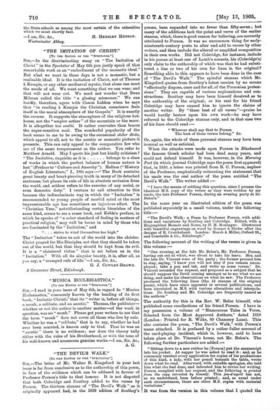"THE IMITATION OF CHRIST."
[To THE EDITOR OP THR "SPECTATOR.1 Sie,—In the discriminating essay on "The Imitation of Christ" in the Spectator of May 6th you justly speak of that remarkable work as an "embodiment of the monastic ideal." But what we want in these days is not a monastic, but a realisable ideal. It is the imitation of Christ, not of Thomas b. Kemple, or any other mediaeval mystic, that alone can meet the needs of all. We want something that we can wear, and that will not wear out. We need not wonder that Dean Milman called the title "a glaring misnomer." We can hardly, therefore, cr with Canon Liddon when he says that "in reading Kemple the Christian conscience feels itself in the moral atmosphere of the Gospels." It is exactly the reverse. It suggests the atmosphere of the religious hot- house, not the "ampler aether" of the mountain or the moor. It is altogether too matte. It rather enervates than braces the super-sensitive soul. The wonderful popularity of the book seems to me to be owing to the occasional obiter dicta, which appeal to all, not to the ascetic or monastic picture it presents. This can only appeal to the comparative few who are of the same temperament as the author. You refer to Matthew Arnold. May I quote his just but kindly criticism?
"The Imitation, exquisite as it is belongs to a class of works in which the perfect balance of human nature is lost" (Preface to" Culture and Anarchy"). Hallam (" History of English Literature," I., 189) says :—" The Book contains great beauty and heart-piercing truth in many of its detached sentences, but places its rule of life in absolute seclusion from the world, and seldom refers to the exercise of any social, or even domestic duty." I venture to call attention to this because the indiscriminate way in which the "Imitation" is recommended. to young people of morbid mind at the most impressionable age has sometimes an injurious effect. The "Christian Year," notwithstanding certain blemishes of the same kind, seems to me a saner book, and Keble's preface, in which he speaks of "a sober standard of feeling in matters of practical religion," may well be borne in mind by those who are fascinated by the "Imitation," and
" . . . strive to wind themselves too high."
The " Imitation " takes us out of the world into the cloister. Christ prayed for His Disciples, not that they should be taken out of the world, but that they should be kept from its evil. It is a "cloistered virtue" that is set before us in the "Imitation." With all its singular beauty, it is, after all, as you say, a "cramped rule of life."—I am, Sir, &c.,
9 Grosvenor Street, Edinburgh.
G. J. COWLEY-BROWN.






































 Previous page
Previous page